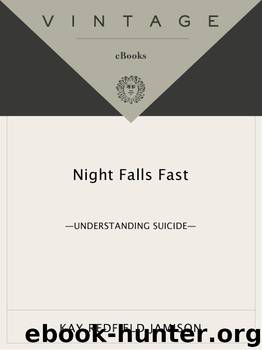Night Falls Fast by Kay Redfield Jamison

Author:Kay Redfield Jamison
Language: eng
Format: azw3, epub
ISBN: 9780307779892
Publisher: Knopf Doubleday Publishing Group
Published: 2011-01-12T06:00:00+00:00
Most of the studies of psychotherapy, or of psychotherapy combined with medication, have focused on the treatment of psychiatric illness; few have dealt specifically with measuring changes in suicidal thinking or behavior. Marsha Linehan, a psychologist at the University of Washington, recently reviewed twenty controlled clinical trials utilizing different forms of psychotherapy with patients at high risk of suicide. In most studies, the patients were selected on the basis of having made at least one suicide attempt. The psychotherapeutic interventions that seemed to be most effective, particularly in patients with borderline personality disorder, sharply focus on changing specific suicidal behaviors and thoughts. These therapies, especially those that are based on identifying and modifying maladaptive behaviors and thinking, appear to work reasonably well in decreasing deliberate self-harm. Keith Hawton at the University of Oxford, in a comprehensive review that included studies of both psychotherapy and medication effects, also found promising results in altering suicidal behaviors. Specific emphasis in several investigations was placed on teaching patients to more effectively handle situations of interpersonal conflict, which, for many of them, had preceded their suicide attempts. It remains unclear whether these therapies prevent actual suicide or suicide attempts only.
Psychotherapy can be extremely helpful not only in sustaining patients through times of terrible psychological suffering and encouraging them to learn better ways of handling suicidal impulses but also in helping them to deal with the critical and gnarly problem of treatment noncompliance. An unwillingness to take medications as prescribed or to keep psychotherapy or medical appointments is a pervasive and potentially life-threatening problem.
Many patients never fill even their initial prescriptions, either because they do not want to take medication or because they cannot afford it; many more stop taking their medication after a few days, weeks, or months of treatment because they experience unpleasant or disabling side effects, feel well and see no point in continuing in treatment, find their dosage schedules too confusing, or simply do not believe they have a psychiatric illness. Perhaps 20 percent of all medical patients on long-term maintenance medications take “holidays” (that is, they stop their medications for a period of time); this can be catastrophic, especially with drugs such as lithium that clear from the body very rapidly.
Compliance is less than ideal in most patients who have any kind of chronic illness. (By way of comparison, in medical conditions such as epilepsy, chronic lung diseases, hypertension, and glaucoma, overall compliance rates range between 50 and 75 percent.) For patients taking antidepressants, the compliance rate is between 65 and 80 percent; for antipsychotic medications, about 55 percent; and for lithium, about 60 percent. (The one study that directly compared one-year compliance rates with lithium and valproate, the anticonvulsant, found compliance rates of 59 percent and 48 percent, respectively.) Compliance rates are even lower in patients who have attempted suicide and who have been given follow-up appointments by emergency room staff or by nurses, doctors, or social workers on the inpatient wards of psychiatric hospitals.
Psychotherapy increases medication compliance in many
Download
This site does not store any files on its server. We only index and link to content provided by other sites. Please contact the content providers to delete copyright contents if any and email us, we'll remove relevant links or contents immediately.
| Grief & Bereavement | Hospice Care |
| Pet Loss | Suicide |
They Both Die at the End by Adam Silvera(9801)
Thirteen Reasons Why by Jay Asher(8883)
The Space Between by Michelle L. Teichman(6923)
Suicide Notes by Michael Thomas Ford(4817)
Tuesdays with Morrie by Mitch Albom(4764)
Suicide: A Study in Sociology by Emile Durkheim(3011)
The Checklist Manifesto by Atul Gawande(2843)
Tuesdays With Morrie by Mitch Albom(2748)
In the Woods by Tana French(2581)
Bossypants by Tina Fey(2519)
Robin by Dave Itzkoff(2433)
Olive Kitteridge by Elizabeth Strout(2365)
No Ashes in the Fire by Darnell L Moore(2328)
Reservoir 13 by Jon McGregor(2295)
End of Days by Sylvia Browne(2175)
All Things New by John Eldredge(2151)
Bus on Jaffa Road by Mike Kelly(2150)
Scar Tissue by Anthony Kiedis(2130)
No Time to Say Goodbye(2108)
